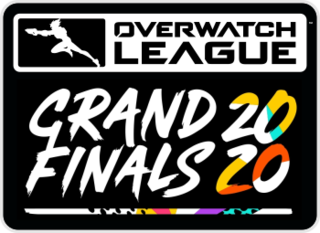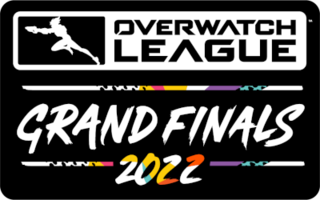
The Overwatch League (OWL) was a professional esports league for the video game Overwatch, produced by its developer, Blizzard Entertainment. From 2018 to 2023, the Overwatch League followed the model of other traditional North American professional sporting leagues by using a set of permanent, city-based teams backed by separate ownership groups. The league used the regular season and playoffs format rather than promotion and relegation used commonly in other esports and non-North American leagues, with players on the roster being assured a minimum annual salary, benefits, and a portion of winnings and revenue-sharing based on team performance.

Dallas Fuel is an American professional Overwatch team based in Dallas, Texas. The Fuel compete in the Overwatch League (OWL) as a member of the league's East region.

The Shanghai Dragons are a professional Overwatch esports team based in Shanghai, China. The Dragons compete in the Overwatch League (OWL) as a member of the league's East region. Founded in 2017, Shanghai Dragons are one of the league's twelve founding members and are one of four professional Overwatch teams based in China. The team is owned by Chinese internet technology company NetEase, who also own Team CC, an academy team for the Dragons that compete in Overwatch Contenders.

The Los Angeles Gladiators are an American professional Overwatch esports team based in Los Angeles, California. The Gladiators compete in the Overwatch League (OWL) as a member of the league's West region. Founded in 2017, the Los Angeles Gladiators are one of twelve founding members of the OWL and are one of two professional Overwatch teams based in Los Angeles. The team is owned by Stan Kroenke and Josh Kroenke of Kroenke Sports & Entertainment, who also owns Gladiators Legion, an academy team for Los Angeles that competed in Overwatch Contenders.

The San Francisco Shock are an American professional Overwatch esports team based in San Francisco, California. The Shock competed in the Overwatch League (OWL) as a member of the league's West region. Founded in 2017, the San Francisco Shock was one of the twelve founding members of the OWL and was one of three professional Overwatch teams in California. The team is owned by Andy Miller, co-owner of the Sacramento Kings and NRG Esports. In their time with the OWL, the Shock won three midseason tournament titles, qualified for four season playoffs, reached the Grand Finals three times, and won back-to-back Grand Finals, making them one of the most accomplished franchise in Overwatch League history.

Overwatch Contenders (OWC) was an international esports league for the video game Overwatch that is organized by Blizzard Entertainment. The series acts as the development league for aspiring Overwatch League (OWL) professionals. Founded in 2017, Contenders was created in part to consolidate existing regional tournaments into a structure to support the Overwatch League, including the Overwatch Apex tournament, Overwatch Premier Series, and Overwatch Pacific Championship.

Seoul Dynasty is a South Korean professional Overwatch esports team based in Seoul, South Korea. The Dynasty compete in the Overwatch League (OWL) as a member of the league's East region. Founded in 2017, Seoul Dynasty is one of the league's twelve founding members and one of two professional Overwatch teams based in South Korea. The team is owned by Kevin Chou of Generation Gaming, who also own and operate an academy team for the Dynasty that compete in Overwatch Contenders (OWC) under the moniker Gen.G Esports.

London Spitfire is a professional Overwatch team representing the city of London, United Kingdom. The Spitfire compete in the Overwatch League (OWL) as a member of the league's West region. Founded in 2017, London Spitfire is one of the league's twelve founding members and is the only professional Overwatch team representing a European city. The team is owned by Jack Etienne and the esports organization Cloud9, who also own British Hurricane, an academy team for the Spitfire that competed in Overwatch Contenders (OWC).

The Atlanta Reign were an American professional Overwatch esports team based in Atlanta, Georgia. The team competed in the Overwatch League (OWL) as a member of the league's West region. Founded in 2018 by Atlanta Esports Ventures, a joint venture between Cox Enterprises and Province, Inc., Atlanta Reign was established as one of the expansion teams for the OWL's 2019 season. They became the first esports team to officially represent the city of Atlanta. The team's ownership also extended to ATL Academy, a former academy team that competed in Overwatch Contenders, the developmental league for the Overwatch League.
The 2020 Atlanta Reign season was the second season of the Atlanta Reign's existence in the Overwatch League and the team's second under head coach Brad "Sephy" Rajani. Atlanta planned to host two homestand weekends in the 2020 season, with the first at the Coca-Cola Roxy in late March and the second at a different, undetermined location in mid-June, but all homestand matches were canceled due to the COVID-19 pandemic.
The 2020 Florida Mayhem season was the third season of the Florida Mayhem's existence in the Overwatch League and the team's first season under head coach Kim "KuKi" Dae-kuk. The Mayhem planned to host two homestand weekends in the 2020 season at the Watsco Center at the University of Miami and the Full Sail Live Venue at Full Sail University, but all homestand matches were canceled due to the COVID-19 pandemic.
The 2020 San Francisco Shock season was the third season of the San Francisco Shock's existence in the Overwatch League and their second under head coach Park "Crusty" Dae-hee. The team entered the season as the defending Overwatch League champions, after winning the 2019 Grand Finals. The Shock planned to host two homestand weekends in the 2020 season at Zellerbach Hall in Berkeley and the San Jose Civic in downtown San Jose, but both were cancelled in light of the COVID-19 pandemic.

The 2020 Overwatch League Grand Finals was the third championship match of the Overwatch League (OWL), which took place on October 10, 2020. The series was the conclusion of the 2020 Overwatch League playoffs and was played between the San Francisco Shock and Seoul Dynasty.
The 2021 Overwatch League season was the fourth season of the Overwatch League (OWL), a professional esports league for the video game Overwatch. The regular season began on April 16, 2021, and concluded on August 21. The season featured four midseason tournaments throughout the regular season along with a new point system for season playoff seeding. Similar to the 2020 season, teams are split into two geographical regions. Due to the COVID-19 pandemic, most matches were played online, with the exception of several live events throughout the season. The season marks the second year of the Overwatch League's broadcast partnership with YouTube, their third with Sport1, and their first with Bilibili.

Kim Byung-sun, better known by his online alias Fleta, is a South Korean Overwatch coach and former professional player. He began his esports career with Flash Lux and had a brief stint playing for Lunatic-Hai. Kim signed with the Seoul Dynasty of the Overwatch League (OWL) in its inaugural season. After two years with the Dynasty, he signed with the Shanghai Dragons. In the middle of the 2023, Kim transitioned to a coaching role.

Kim Ji-hyeok (Korean: 김지혁), better known by his online alias Birdring, is a South Korean professional Overwatch player who played for several teams in the Overwatch League (OWL). He is best known for playing hitscan damage heroes, such as the sniper Widowmaker and highly-mobile Tracer. Prior to the OWL's inception, he played for KongDoo Uncia, KongDoo Panthera, and Cloud9 KongDoo. Birdring signed with the London Spitfire of the OWL in the league's inaugural season wherein he was selected to play in the All-Star Game and won the league's first Grand Finals, after the Spitfire defeated the Philadelphia Fusion. After two seasons with the Spitfire, Birdring signed with the Los Angeles Gladiators. After two seasons with the Gladiators, Birdring retired from professional Overwatch. He came out of retirement a year later and joined the Boston Uprising.

The 2021 Overwatch League Grand Finals was the fourth championship match of the Overwatch League (OWL), taking place on September 25, 2021. The series was the conclusion of the 2021 Overwatch League playoffs and was played between the Shanghai Dragons and the Atlanta Reign. The final was originally planned to be played at the Galen Center in Los Angeles, California; however, due to the increasing threat of COVID-19 and the delta variant, the match was shifted to be played online.

The 2022 Overwatch League season was the fifth season of the Overwatch League (OWL), a professional esports league. Contrasted to the first four seasons, which was played on the video game Overwatch, the season was played on an early build of Overwatch 2. The regular season began on May 5, 2022, and ended on October 22. The playoffs were played at the Anaheim Convention Center in Anaheim, California, beginning on October 30, and concluded with the Grand Finals on November 4. The Dallas Fuel won the Grand Finals over the San Francisco Shock to win their first OWL championship.

The 2022 Overwatch League Grand Finals was the fifth championship match of the Overwatch League (OWL), taking place on November 4, 2022. The series was the conclusion of the 2022 Overwatch League playoffs and was played between the Dallas Fuel and the San Francisco Shock at the Anaheim Convention Center in Anaheim, California.
The 2023 Overwatch League season was the sixth season of the Overwatch League (OWL), a professional esports league for the video game Overwatch 2. The teams were split between two regions: the East and the West. The season commenced with a preseason pro-am tournament held in the West Region, where Overwatch Contenders teams competed against Overwatch League teams. In the East Region, Overwatch Contenders teams joined the regular season alongside the established Overwatch League teams. The regular season was divided into two stages: Spring and Summer. The Spring stage, which began on April 27, concluded with the Midseason Madness, an interregional midseason tournament hosted in Seoul, South Korea. The Summer stage concluded with play-ins, season playoffs, and the Grand Finals. The playoffs were scheduled to take place at the Mattamy Athletic Centre in Toronto, Canada.


















